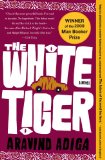Summary | Excerpt | Reading Guide | Reviews | Beyond the Book | Readalikes | Genres & Themes | Author Bio

A Novel
by Aravind Adiga
The door of the Ambassador opened: a man got out with a notebook. The regular customers of the tea shop could go on eating, but my father and the others gathered in a line.
The man with the notebook was not the Buffalo; he was the assistant.
There was another fellow inside the Ambassador; a stout one with a bald, brown, dimpled head, a serene expression on his face, and a shotgun on his lap.
He was the Buffalo.
The Buffalo was one of the landlords in Laxmangarh. There were three others, and each had got his name from the peculiarities of appetite that had been detected in him.
The Stork was a fat man with a fat mustache, thick and curved and pointy at the tips. He owned the river that flowed outside the village, and he took a cut of every catch of fish caught by every fisherman in the river, and a toll from every boatman who crossed the river to come to our village.
His brother was called the Wild Boar. This fellow owned all the good agricultural land around Laxmangarh. If you wanted to work on those lands, you had to bow down to his feet, and touch the dust under his slippers, and agree to swallow his day wages. When he passed by women, his car would stop; the windows would roll down to reveal his grin; two of his teeth, on either side of his nose, were long and curved, like little tusks.
The Raven owned the worst land, which was the dry, rocky hillside around the fort, and took a cut from the goatherds who went up there to graze with their flocks. If they didn't have their money, he liked to dip his beak into their backsides, so they called him the Raven.
The Buffalo was greediest of the lot. He had eaten up the rickshaws and the roads. So if you ran a rickshaw, or used the road, you had to pay him his feed -- one-third of whatever you earned, no less.
All four of the Animals lived in high-walled mansions just outside Laxmangarh -- the landlords' quarters. They had their own temples inside the mansions, and their own wells and ponds, and did not need to come out into the village except to feed. Once upon a time, the children of the four Animals went around town in their own cars; Kusum remembered those days. But after the Buffalo's son had been kidnapped by the Naxals -- perhaps you've heard about them, Mr. Jiabao, since they're Communists, just like you, and go around shooting rich people on principle -- the four Animals had sent their sons and daughters away, to Dhanbad or to Delhi.
Their children were gone, but the Animals stayed and fed on the village, and everything that grew in it, until there was nothing left for anyone else to feed on. So the rest of the village left Laxmangarh for food. Each year, all the men in the village waited in a big group outside the tea shop. When the buses came, they got on -- packing the inside, hanging from the railings, climbing onto the roofs -- and went to Gaya; there they went to the station and rushed into the trains -- packing the inside, hanging from the railings, climbing onto the roofs -- and went to Delhi, Calcutta, and Dhanbad to find work.
A month before the rains, the men came back from Dhanbad and Delhi and Calcutta, leaner, darker, angrier, but with money in their pockets. The women were waiting for them. They hid behind the door, and as soon as the men walked in, they pounced, like wildcats on a slab of flesh. There was fighting and wailing and shrieking. My uncles would resist, and managed to keep some of their money, but my father got peeled and skinned every time. "I survived the city, but I couldn't survive the women in my home," he would say, sunk into a corner of the room. The women would feed him after they fed the buffalo.
I would come to him, and play around with him, by climbing his back, and passing my palm over his forehead -- over his eyes -- over his nose -- and down to his neck, to the little depression at the pit of his neck. I would let my finger linger there -- it still is my favorite part of the human body.
Copyright © 2008 by Aravind Adiga
Your guide toexceptional books
BookBrowse seeks out and recommends the best in contemporary fiction and nonfiction—books that not only engage and entertain but also deepen our understanding of ourselves and the world around us.